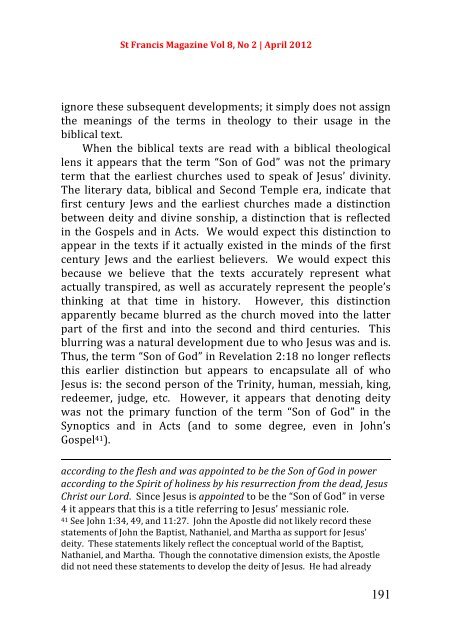Untitled - St.Francis Magazine
Untitled - St.Francis Magazine
Untitled - St.Francis Magazine
Create successful ePaper yourself
Turn your PDF publications into a flip-book with our unique Google optimized e-Paper software.
<strong>St</strong> <strong>Francis</strong> <strong>Magazine</strong> Vol 8, No 2 | April 2012 ignore these subsequent developments; it simply does not assign the meanings of the terms in theology to their usage in the biblical text. When the biblical texts are read with a biblical theological lens it appears that the term “Son of God” was not the primary term that the earliest churches used to speak of Jesus’ divinity. The literary data, biblical and Second Temple era, indicate that first century Jews and the earliest churches made a distinction between deity and divine sonship, a distinction that is reflected in the Gospels and in Acts. We would expect this distinction to appear in the texts if it actually existed in the minds of the first century Jews and the earliest believers. We would expect this because we believe that the texts accurately represent what actually transpired, as well as accurately represent the people’s thinking at that time in history. However, this distinction apparently became blurred as the church moved into the latter part of the first and into the second and third centuries. This blurring was a natural development due to who Jesus was and is. Thus, the term “Son of God” in Revelation 2:18 no longer reflects this earlier distinction but appears to encapsulate all of who Jesus is: the second person of the Trinity, human, messiah, king, redeemer, judge, etc. However, it appears that denoting deity was not the primary function of the term “Son of God” in the Synoptics and in Acts (and to some degree, even in John’s Gospel 41 ). according to the flesh and was appointed to be the Son of God in power according to the Spirit of holiness by his resurrection from the dead, Jesus Christ our Lord. Since Jesus is appointed to be the “Son of God” in verse 4 it appears that this is a title referring to Jesus’ messianic role. 41 See John 1:34, 49, and 11:27. John the Apostle did not likely record these statements of John the Baptist, Nathaniel, and Martha as support for Jesus’ deity. These statements likely reflect the conceptual world of the Baptist, Nathaniel, and Martha. Though the connotative dimension exists, the Apostle did not need these statements to develop the deity of Jesus. He had already 191







![Reflections on Surah Fatiha and the Lord's Prayer[1] - St.Francis ...](https://img.yumpu.com/49377951/1/184x260/reflections-on-surah-fatiha-and-the-lords-prayer1-stfrancis-.jpg?quality=85)








